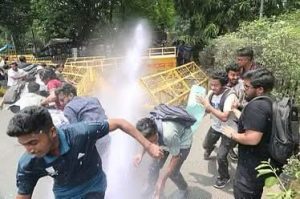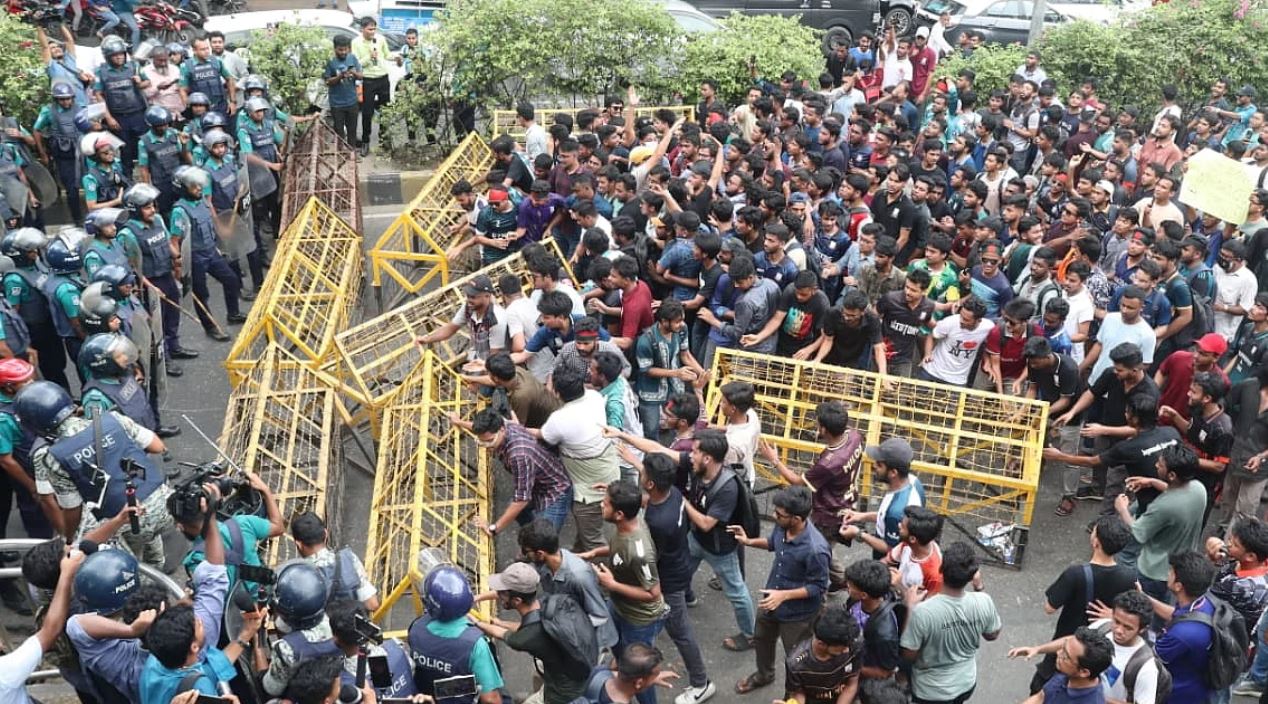Within a span of just six days, Bangladesh has witnessed starkly contrasting police responses to two separate public demonstrations in Dhaka, raising serious concerns about selective law enforcement and political bias.
The first demonstration, held on May 8 near the official residence of the chief adviser, called for the banning of the Awami League, a party long accused of authoritarianism and mass human rights violations.
Organised by the newly formed National Citizen Party and its right-wing Islamic allies, the protest was politically charged yet met with leniency. Law enforcement officers supported them with city authorities visibly sprinkled cold water to the demonstrators to cope with the sweltering summer heat. And, the interim government responded swiftly—issuing two ordinances within three days that aligned with the protesters’ demands.
In contrast, a student-teacher protest march on Wednesday demanding increased budget allocations, housing support, and a second campus for Jagannath University was met with suppression.
As hundreds of students and teachers marched peacefully from the Old Dhaka campus to Kakrail, they were blocked near the Kakrail Mosque by police. When protesters tried to push through, they were met with batons, tear gas, sound grenades, and water cannons.
More than 100 people were injured in the assault, including several faculty members. Many were being undergoing treatment at various health facilities in Dhaka.
Among the wounded were JnU Teachers’ Association general secretary Rois Uddin. Besides Rois, JnU assistant proctor Naim Akter Siddique, English department teacher Nasiruddin and History department teacher Mohammad Belal, among others, were also injured.
Protesters later regrouped, vowing to remain on the streets until their demands were met.
Rois Uddin told reporters that they were hurt by the act of the government.
“Attack was carried out on the teachers and students. Over 100 students were injured. Members of the police responsible for this attack must be brought to book,” he said.
“We were attacked for demanding educational rights,” he said.

The protesters’ demands include approval of 70 housing scholarships starting fiscal year 2025-26, full approval of JnU’s proposed budget without cuts, and priority approval of a second JnU campus at the next ECNEC meeting.
Witnesses described chaotic scenes as police indiscriminately charged into the crowd near Matshya Bhaban, chasing protesters down adjacent roads.
The suppression came just two days after Home Affairs Adviser Jahangir Alam publicly suggested that the police force would refrain from using lethal tactics.
The disproportionate treatment of the two demonstrations has ignited widespread criticism on social media and among civic groups.
“If you side with them, you get cold water. If you don’t, you get batons,” one netizen, Shahjahan Mollah, posted on Facebook.
Bangladesh’s Constitution clearly states in Article 27 that all citizens are equal before the law and entitled to equal protection. Article 19(1) further obliges the state to ensure equality of opportunity.
As calls grow for accountability, Wednesday’s suppression has become a flashpoint in the broader debate over political impartiality and freedom of assembly in Bangladesh as the country awaits democratic transition.


